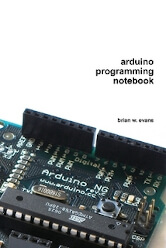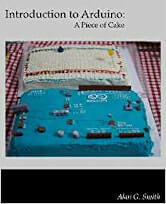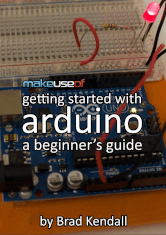Last Updated on November 22, 2025
The Arduino is an inexpensive, flexible, open source microcontroller platform designed to make it easy for hobbyists to use electronics in homemade projects. With an almost unlimited range of input and output add-ons, sensors, indicators, displays, motors, and more, the Arduino offers you many ways to create devices that interact with the world around you.
Arduino board designs use a variety of microprocessors and controllers. The boards are equipped with sets of digital and analog input/output (I/O) pins that may be interfaced to various expansion boards or breadboards (shields) and other circuits.
Use an Arduino to make robots, remote controlled cars, 3D printers, video games, home automation systems, and much more.
Here’s our recommended books to get you up and running.
1. Arduino Programming Notebook by Brian Evans
 Arduino Programming Noteboo is a beginner’s reference to the programming syntax of the Arduino microcontroller. Includes information on program structure, variables, datatypes, arithmetic, constants, flow control, and most of the common functions of the core library.
Arduino Programming Noteboo is a beginner’s reference to the programming syntax of the Arduino microcontroller. Includes information on program structure, variables, datatypes, arithmetic, constants, flow control, and most of the common functions of the core library.
The book also includes an appendix with schematics and simple programs for several common tasks.
2. Introduction to Arduino – A piece of cake! by Alan G. Smith
 Introduction to Arduino – A piece of cake! expects no previous knowledge in electronics or programming. Instead of going into depth teaching those topics, it teaches only enough so that you can make things.
Introduction to Arduino – A piece of cake! expects no previous knowledge in electronics or programming. Instead of going into depth teaching those topics, it teaches only enough so that you can make things.
In this book, you will:
- Use lights to quickly learn basic programming concepts.
- Make noise and music on a speaker.
- Make a digital thermometer.
- Add graphics to your thermometer to show a graph of recorded temperature.
- Play with sensors to detect light, magnets, and knocking.
- Make a rubber band gun that uses a joystick for panning, tilting, and firing.
- Be encouraged to go create your own projects!
There are exercises after each chapter (with sample solutions) to help you make sure you understand the concepts.
3. Getting started with Arduino – A Beginner’s Guide by Brad Kendall
 Getting started with Arduino – A Beginner’s Guide is a 34 page book that offers an electrical component overview covering the breadboard, LED, photo resistor, tactile switch, piezo speaker, resistor, and jumper wires.
Getting started with Arduino – A Beginner’s Guide is a 34 page book that offers an electrical component overview covering the breadboard, LED, photo resistor, tactile switch, piezo speaker, resistor, and jumper wires.
Later chapters offer a programming overview including variables, functions, logic overview. There’s also a chapter on setting up an Arduino. The book ends with projects including how to build a calculator, make LEDs blink, make music with an Arduino, and more.
Next page: Page 2 – 20 Unbelievable Arduino Projects and more books
Pages in this article:
Page 1 – Arduino Programming Notebook and more books
Page 2 – 20 Unbelievable Arduino Projects and more books
Page 3 – Arduino Projects Book
All books in this series:
| Free Programming Books | |
|---|---|
| Ada | ALGOL-like programming language, extended from Pascal and other languages |
| Agda | Dependently typed functional language based on intuitionistic Type Theory |
| Arduino | Inexpensive, flexible, open source microcontroller platform |
| Assembly | As close to writing machine code without writing in pure hexadecimal |
| Awk | Versatile language designed for pattern scanning and processing language |
| Bash | Shell and command language; popular both as a shell and a scripting language |
| BASIC | Beginner’s All-purpose Symbolic Instruction Code |
| C | General-purpose, procedural, portable, high-level language |
| C++ | General-purpose, portable, free-form, multi-paradigm language |
| C# | Combines the power and flexibility of C++ with the simplicity of Visual Basic |
| Clojure | Dialect of the Lisp programming language |
| ClojureScript | Compiler for Clojure that targets JavaScript |
| COBOL | Common Business-Oriented Language |
| CoffeeScript | Transcompiles into JavaScript inspired by Ruby, Python and Haskell |
| Coq | Dependently typed language similar to Agda, Idris, F* and others |
| Crystal | General-purpose, concurrent, multi-paradigm, object-oriented language |
| CSS | CSS (Cascading Style Sheets) specifies a web page’s appearance |
| D | General-purpose systems programming language with a C-like syntax |
| Dart | Client-optimized language for fast apps on multiple platforms |
| Dylan | Multi-paradigm language supporting functional and object-oriented coding |
| ECMAScript | Best known as the language embedded in web browsers |
| Eiffel | Object-oriented language designed by Bertrand Meyer |
| Elixir | Relatively new functional language running on the Erlang virtual machine |
| Erlang | General-purpose, concurrent, declarative, functional language |
| F# | Uses functional, imperative, and object-oriented programming methods |
| Factor | Dynamic stack-based programming language |
| Forth | Imperative stack-based programming language |
| Fortran | The first high-level language, using the first compiler |
| Go | Compiled, statically typed programming language |
| Groovy | Powerful, optionally typed and dynamic language |
| Haskell | Standardized, general-purpose, polymorphically, statically typed language |
| HTML | HyperText Markup Language |
| Icon | Wide variety of features for processing and presenting symbolic data |
| J | Array programming language based primarily on APL |
| Java | General-purpose, concurrent, class-based, object-oriented, high-level language |
| JavaScript | Interpreted, prototype-based, scripting language |
| Julia | High-level, high-performance language for technical computing |
| Kotlin | More modern version of Java |
| LabVIEW | Designed to enable domain experts to build power systems quickly |
| LaTeX | Professional document preparation system and document markup language |
| Lisp | Unique features - excellent to study programming constructs |
| Logo | Dialect of Lisp that features interactivity, modularity, extensibility |
| Lua | Designed as an embeddable scripting language |
| Markdown | Plain text formatting syntax designed to be easy-to-read and easy-to-write |
| Objective-C | Object-oriented language that adds Smalltalk-style messaging to C |
| OCaml | The main implementation of the Caml language |
| Pascal | Imperative and procedural language designed in the late 1960s |
| Perl | High-level, general-purpose, interpreted, scripting, dynamic language |
| PHP | PHP has been at the helm of the web for many years |
| PostScript | Interpreted, stack-based and Turing complete language |
| Prolog | A general purpose, declarative, logic programming language |
| PureScript | Small strongly, statically typed language compiling to JavaScript |
| Python | General-purpose, structured, powerful language |
| QML | Hierarchical declarative language for user interface layout - JSON-like syntax |
| R | De facto standard among statisticians and data analysts |
| Racket | General-purpose, object-oriented, multi-paradigm, functional language |
| Raku | Member of the Perl family of programming languages |
| Ruby | General purpose, scripting, structured, flexible, fully object-oriented language |
| Rust | Ideal for systems, embedded, and other performance critical code |
| Scala | Modern, object-functional, multi-paradigm, Java-based language |
| Scheme | A general-purpose, functional language descended from Lisp and Algol |
| Scratch | Visual programming language designed for 8-16 year-old children |
| SQL | Access and manipulate data held in a relational database management system |
| Standard ML | General-purpose functional language characterized as "Lisp with types" |
| Swift | Powerful and intuitive general-purpose programming language |
| Tcl | Dynamic language based on concepts of Lisp, C, and Unix shells |
| TeX | Markup and programming language - create professional quality typeset text |
| TypeScript | Strict syntactical superset of JavaScript adding optional static typing |
| Vala | Object-oriented language, syntactically similar to C# |
| VHDL | Hardware description language used in electronic design automation |
| VimL | Powerful scripting language of the Vim editor |
| XML | Rules for defining semantic tags describing structure ad meaning |
